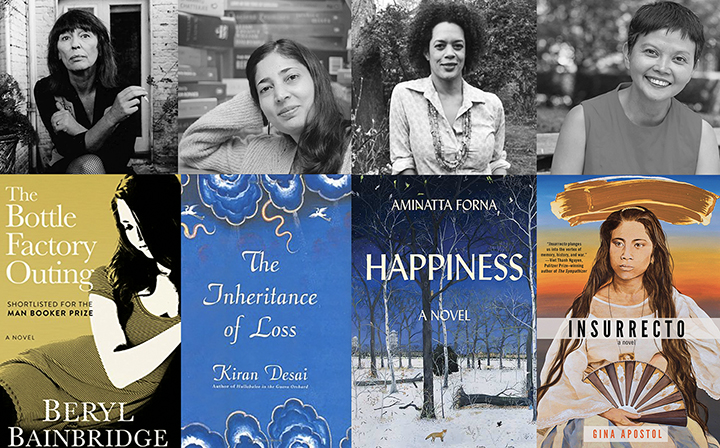
- This event has passed.
Women Write on the Verge of Historical Change: Last session

convened with the Literature Group of The MEP
Last session with Insurrecto by Gina Apostol
Historical change, not historical fiction! We believe that reading well-wrought literature allows us to understand the undercurrents of history in unique and challenging ways. During this term, the MEP Literature Studies Group will read novels by women writers which explore the intersections of life in their communities, both at home and in the metropoles of Europe, India and the Philippines. These stories will take us to places and introduce us to people facing many of the dilemmas posed during late-stage capitalism, when the looming tipping points begin to collide. Reading and discussing these important writers could very well bring us to a broader sense of time and place.
THE BOTTLE FACTORY OUTING • Beryl Bainbridge • 1973 / As dark and doomful as it is hilarious, Beryl Bainbridge’s Booker Prize-nominated novel follows Freda and Brenda, two unlucky-in-love bedsit-mates working in a wine-bottling factory in London, who find that their lives change forever after a team outing. Bainbridge based the novel on a miserable warehouse job she held in the late fifties, which came with the added ‘perk’ of an unlimited wine allowance. We have completed our discussion of this book.
THE INHERITANCE OF LOSS • Kiran Desai • 2006 / The main themes are migration, living between two worlds, as well as living between the past and present. The story centers around the lives of Biju and Sai. Biju is an Indian living in the United States illegally, son of a cook who works for Sai’s grandfather. Sai is an orphan living in mountainous Kalimpong with her maternal grandfather Jemubhai Patel; the cook; and a dog named Mutt. Biju, the other character is an illegal alien residing in the United States, trying to make a new life for himself, and contrasts this with the experiences of Sai, an anglicized Indian girl living with her grandfather in India. We have completed our discussion of this book.
HAPPINESS • Aminatta Forna • 2018 / Waterloo Bridge, London. Two strangers collide. Attila, a Ghanaian psychiatrist, and Jean, an American studying the habits of urban foxes. From this chance encounter in the midst of the rush of a great city, numerous moments of connections span out and interweave, bringing disparate lives together. Attila has arrived in London with two tasks: to deliver a keynote speech on trauma and to check up on the daughter of friends, his ‘niece,’ Ama, who hasn’t called home in a while. It soon emerges that she has been swept up in an immigration crackdown—and now her young son Tano is missing. We have completed our discussion of this book.
INSURRECTO • Gina Apostol • 2018 / This novel’s structure reflects how history comes at us in scattered shards, the way voices are amplified or silenced, story lines invented or forgotten. “We enter others’ lives through two mediums, words and time, both faulty,” one character observes. But a third medium — image — is a powerful recurring motif. Apostol is obsessed with the lens, the gaze, the way victim and victor, good and evil are identified based on who holds the camera and who consumes its product. Apostol pushes up against the limits of fiction in order to recover the atrocity in Balangiga, and in so doing, she shows us the dark heart of an untold and forgotten war that would shape the next century of the Philippines and in the United States.
Inspired by a presentation by Roxanne Dunbar-Ortiz on her Indigenous Peoples History of the United States – and her recommendation we also read Leslie Marmon Silko’s Almanac of the Dead – The MEP LITERATURE GROUP has been meeting since the first days of The Marxist Education Project in 2014. Each session, the Literature Group takes a thematic, historical, and political approach to the selections, which have included in-depth reading of Marlon James’ A Brief History of Seven Killings, Victor Serge’s Unforgiving Years, followed by Thomas Pynchon’s Gravity’s Rainbow, as well as groups focused on World War I, the depression of the 1930s, novels on migration, border politics, and labor organizing, Brecht plays, African novels from the continent, and our most recent session on Women Who Wrote Against Fascism. The group is now completing a fifth summer immersed in noir fiction, which will resume with a sixth summer noir series next year.
